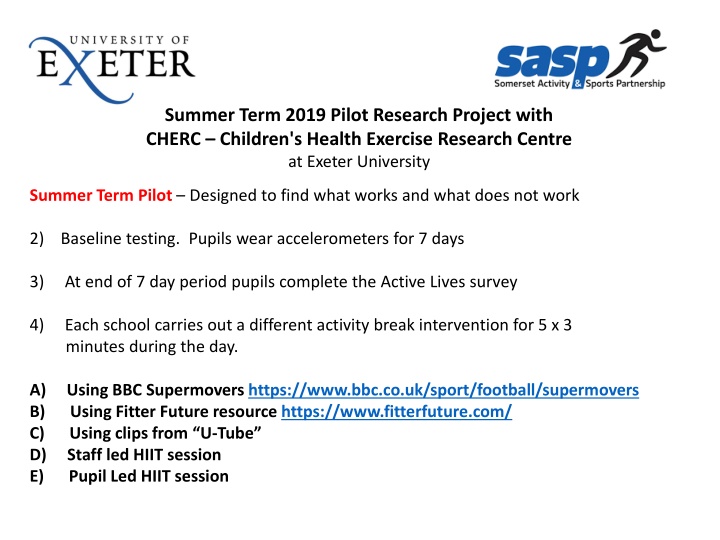
Research Project on Children's Physical Activity Interventions
Explore a pilot research project conducted in summer 2019 by CHERC at Exeter University, focusing on different physical activity interventions for school children. Baseline testing, accelerometer tracking, and activity breaks were implemented to assess effectiveness. Feedback from participating schools indicated positive outcomes with improved physical activity levels and cognitive engagement. Data analysis showed increased moderate to vigorous physical activity and reduced sedentary behavior.
Download Presentation

Please find below an Image/Link to download the presentation.
The content on the website is provided AS IS for your information and personal use only. It may not be sold, licensed, or shared on other websites without obtaining consent from the author. If you encounter any issues during the download, it is possible that the publisher has removed the file from their server.
You are allowed to download the files provided on this website for personal or commercial use, subject to the condition that they are used lawfully. All files are the property of their respective owners.
The content on the website is provided AS IS for your information and personal use only. It may not be sold, licensed, or shared on other websites without obtaining consent from the author.
E N D
Presentation Transcript
Summer Term 2019 Pilot Research Project with CHERC Children's Health Exercise Research Centre at Exeter University Summer Term Pilot Designed to find what works and what does not work 2) Baseline testing. Pupils wear accelerometers for 7 days 3) At end of 7 day period pupils complete the Active Lives survey 4) Each school carries out a different activity break intervention for 5 x 3 minutes during the day. A) B) C) D) E) Using BBC Supermovers https://www.bbc.co.uk/sport/football/supermovers Using Fitter Future resource https://www.fitterfuture.com/ Using clips from U-Tube Staff led HIIT session Pupil Led HIIT session
Pilot involved 5 schools using pupils from Yrs 3/4 1) St James Primary, Taunton 2) Catcott Primary School 3) St Joseph s Primary - Bridgwater 4) Hamp Academy 5) Manor Court
Feedback from St James who used Fitter Futures 1) Sessions easy to manage. Resources on line, (teacher simply set it up at the start of the day in a window on their computer) 2) Hardest part was starting - trepidation, worry about how the children would react, would it disrupt the flow of the lesson or take too much time away from the many things in terms of classroom subjects that teachers have to deliver every day. However this was not the case 3) Just needed Teacher resilience to keep doing it 4) During activity break the teacher was able to go look at the children's work and then quickly plan to intervene/challenge/help/direct adults in the room etc. 5)The children would occasionally ask and interrupt learning and the lesson to ask to do their activity! 6) The kids LOVED it. Well 90% plus did!. 7) The teacher reported that they were easy to settle afterwards, 8) The teacher reported that using this was a great tool to aid learning. The children were more focussed afterwards. When they were finding something hard, were a bit jaded, a bit flat and sleepy, slightly unsettled or it felt like they needed a re-focus, the exercise was brilliant at doing that and usually the children settled and were much more on task after the exercise input than before. 9) The children definitely got fitter - this was done via teacher observation at the number of exercises completed and how quickly and easily the exercises were done. Also the children who were overweight and unfit made more progress than the rest.
Data from Accelerometers 1. 85% of students achieved at least 60 min Moderate Vigorous Physical Activity (PA) per day, i.e. achieve the guidelines. 2. Pupils were 20% more active at school compared to at the weekend. 3. Pupils get an extra 25% (12 minutes) of vigorous PA during the HIIT intervention in schools compared to the weekend. 4. 43% of pupils routinely get >8 hours sleep per night. The average is 7.5 hours. 5. Pupils get ~45 min less sleep per night during the week.
Masters Research Project 2019-20 Active 30 : 30 Reducing sedentary behaviour in the classroom Introducing regular short (1-3min) exercise breaks Measuring impact on: time on task, recall, behaviour, self esteem, mental health 10 minute online questionnaire (Flyer in delegate pack) optional 15-20 minute telephone interview/ focus group meeting to explore your values, opinions and experiences surrounding the successful implementation of physical activity into the classroom Headteacher Interviews Activity Tracking / Research after Christmas






















